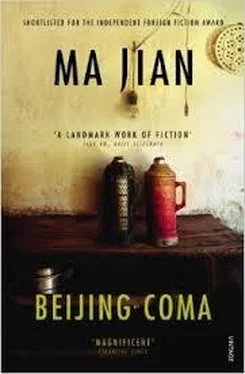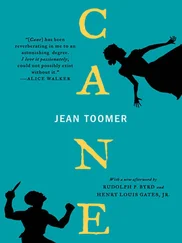‘You don’t look like a hunger striker to me!’ I joked.
‘I’d like to see you give it a go,’ he said, pointing to the needle prick on his swollen arm. ‘I haven’t eaten for five days.’
‘There’s a heavy rainstorm forecast for this afternoon,’ I said. ‘What are we going to do with all those boxes of supplies stacked outside?’ I noticed that Chuchu looked a little crestfallen. Everyone had forgotten about her map.
‘There’s a long line of vans over there queuing up to deliver more supplies,’ Big Chan said. ‘Peasants from the suburbs have just given us a truckload of garlic and cucumbers, a food factory has donated a ton of sliced bread, and we’ve got four piles of woks over there.’
‘It doesn’t seem right to have these mountains of food here while the hunger strikers are starving themselves to death,’ Little Chan said, looking up quizzically at Big Chan. They’d swapped watches with each other. The digital watch Little Chan was wearing had no night-light.
‘Dai Wei, we’ve brought the minibus over,’ Old Fu said. ‘It’s going to be our “broadcast minibus”. I want you to install a PA system. Spend whatever you need.’
‘Don’t worry, I’ll do it,’ Chen Di said, obviously thinking I wasn’t up to the job. ‘You stick to cutting hair, Dai Wei.’
‘Well, let me know if you need any help,’ I said, relieved to be absolved of the task.
Old Fu then turned to Hai Feng and told him to go back and tell Liu Gang and Shu Tong to move the Organising Committee to the Square and just leave a logistics office back at the campus. He’d forgotten that two days before he’d opposed the proposal to invite Shu Tong back to the Square.
‘The weather’s so hot now, our priority must be to prevent any outbreak of infectious diseases,’ I said. Seeing that Chuchu was about to leave, I went over to her and said, ‘Thank you so much for your map. I’m head of the student marshal team, so it will be especially useful to me.’
‘It was no problem, I just wanted to help,’ she said, turning to go. ‘Goodbye, then.’ She’d been standing on her own for ten minutes. Boys are always unwilling to speak to girls who are much taller than them.
As she left, a strong gust of wind suddenly blasted through the Square, sending plastic bags, magazines and paper boxes swirling into the air. The walls of the broadcast station’s tent flapped up, and all the scripts and newspapers flew out. Our eyes became blinded by dust.
‘My God!’ Nuwa spluttered, crouching down in the corner of the tent. The canvas roof was bound to the bamboo frame with thick rope, and tied at both ends to the marble balustrades outside. I knew it wouldn’t fall off.
‘Damn, the rainstorm’s about to arrive!’ Chen Di shouted, pulling the blanket off the camp bed and flinging it over the electrical equipment.
‘There are still a few hunger strikers lying outside, without shelter,’ I said, helping to pick up the scripts scattered on the ground.
‘I gave them umbrellas,’ Old Fu said, squatting down and clutching his backpack. ‘Dai Wei, muster your troops and go and make an inspection of our camp.’
‘My marshals have gone to help Lin Lu get the rest of the hunger strikers to board the buses,’ I said. ‘The Beijing University hunger strikers moved into the buses a couple of hours ago.’
The wind was now howling. Zhang Jie and Mao Da staggered up with their hands over their noses and mouths. ‘I thought we were getting eighty buses,’ Zhang Jie shouted at Old Fu, ‘but there are only fifty parked out there. Lin Lu wants you to go over and have a look.’
Hot gusts of dust swept through the Square, then the sky darkened and a torrential rain plummeted down. Half the tent’s roof was lifted into the air and we were immediately drenched. Everyone squeezed into a corner, except Nuwa who hid under the plastic sheet covering the amplifiers. I watched the cardboard boxes of sliced bread outside collapse in the downpour. Cold, sodden students ran over to us, asking if we had umbrellas or raincoats.
When the rain began to seep through to the amplifiers under the plastic, we quickly unplugged them and shifted them onto the camp bed under the only remaining patch of roof. Then I moved the rest of the equipment over and began reconnecting the wires. Mou Sen told Nuwa to make an announcement. She grabbed the microphone for a second then decided instead to play ‘The Five-Star Red Flag Flaps in the Wind’ to ease the mood of crisis that had gripped the Square.
Although I had no umbrella, I decided to climb up the Monument to get a better view of the situation. I grasped a balustrade and pulled myself onto the lower terrace. The Square was enveloped in a thick grey haze of rain. I looked over to the fifty buses parked in neat rows to the north. The hunger strikers had rushed inside them as soon as the rain clouds had burst. Their abandoned camps looked like a huge empty car park now. Chairman Mao’s portrait on Tiananmen Gate was a blur behind the sheets of falling rain.
The day before, I’d seen a Beijing resident march to the Square holding up a large photograph of Mao. He said he’d come to support the students. I asked him whether he knew of the Tiananmen Incident of 1976, when Mao sanctioned the use of force to quell a protest staged by tens of thousands of Beijing citizens against the Gang of Four. He said he’d never heard of the event. It wasn’t his fault. For forty years, the Communist Party had worked hard at erasing history. If my father hadn’t left behind his journal, I wouldn’t have known the true horrors of the Anti-Rightist Campaign and the Cultural Revolution. No one is sure how many millions of people died under Mao’s rule. Wang Fei told me that, after the madcap Great Leap Forward of 1958 to 1960, when Mao ordered peasants to abandon their fields and produce steel in small ‘backyard’ furnaces, twelve million people died of starvation in Sichuan Province alone.
At last the torrents stopped and the clouds were blown away by the wind. Water dripped from boxes, bags and plastic shelters. Newspapers, pamphlets, empty juice cartons, posters and banners floated on the shallow lake that covered the Square.
‘Quick, broadcast an announcement telling everyone to clear up the rubbish that’s floating about,’ Cheng Bing said to Old Fu. Her hair was soaking wet. She looked very ill. I didn’t know whether she was still on hunger strike or not.
‘Do you have a script for me?’ said Old Fu, treading through a puddle of ink-stained water. ‘No? Well there’s no dry paper here for me to write on. Why not ask a doctor from the emergency tent to make the announcement?’
Inside the tent, everyone was still busy sorting out the equipment. ‘What a shame!’ said Chen Di, scooping the map Chuchu had drawn for us out of a puddle. ‘It’s ruined before we even had a chance to use it.’
I had no dry clothes to change into, so I went to find Tang Guoxian, who was the same height as me, to see if I could borrow some from him.
When I returned to the tent, I suddenly remembered that I still hadn’t sent a telegram to my brother who was on hunger strike in Sichuan, so I went in search of some students from his university to see if they had any news from him.
I walked up and down the maze of buses parked along the northern end of the Square. University banners started popping out again from the windows. The posters that had been stuck to the sides of the buses dripped their red and black ink onto the ground. Nurses in white coats were rushing back and forth, giving transfusions to sick students or carrying hunger strikers away on stretchers. Inside the buses, there was only enough room on the ground for three or four students to lie down. Most of the hunger strikers had to sit on the seats and rest their heads on each other’s shoulders.
Читать дальше












